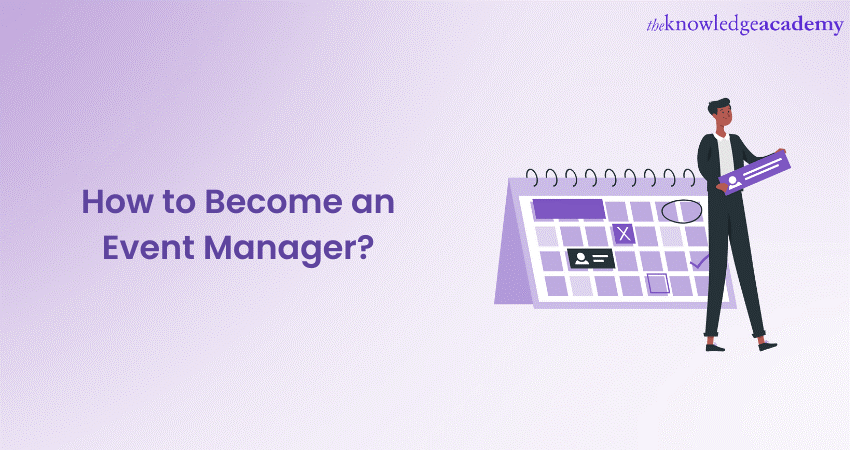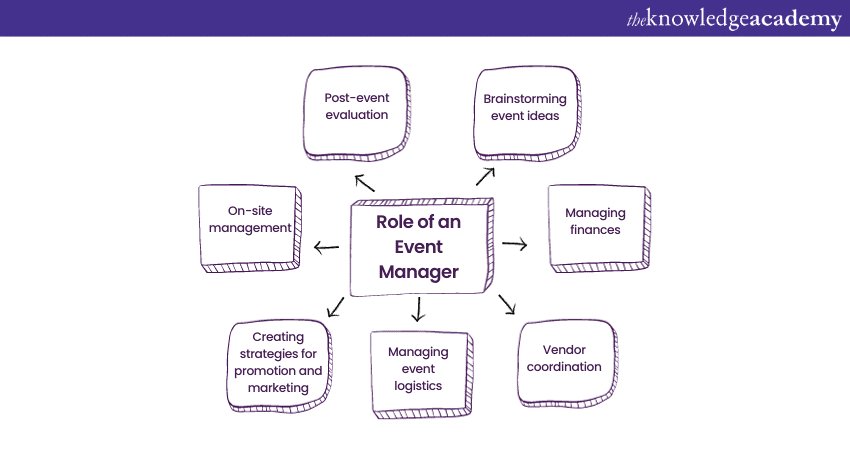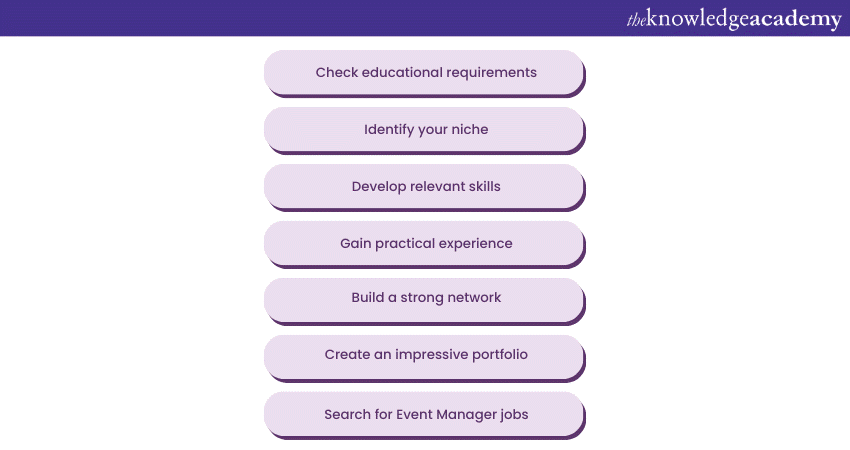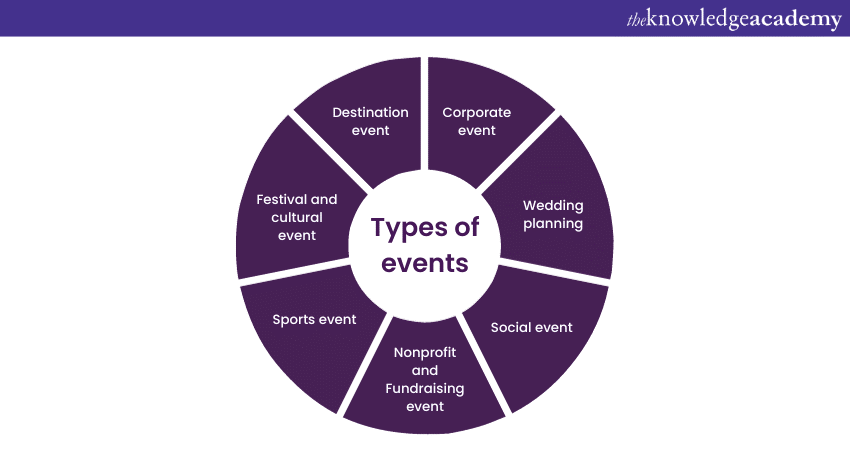We may not have the course you’re looking for. If you enquire or give us a call on 01344203999 and speak to our training experts, we may still be able to help with your training requirements.
Training Outcomes Within Your Budget!
We ensure quality, budget-alignment, and timely delivery by our expert instructors.

From weddings to corporate conferences, Event Managers are at the heart of things, orchestrating everything. Thus, for people seeking to build a strong career in the Event Management industry, it’s crucial to understand How to Become an Event Manager and what are the steps involved that can provide you with the clarity to pursue this career path.
According to Glassdoor, the average salary of an Event Manager in the UK is about £43,000 annually. Moreover, it can go higher based on your skillset and experience. So, if you are interested in pursuing this Event Management career, then it’s the right time to understand the steps involved in becoming one. Read this blog to learn How to Become an Event Manager with a step-by-step guide. Let's delve in deeper to learn more!
Table of Contents
1) Understanding the role of an Event Manager
2) How to Become an Event Manager? Step-by-step guide
a) Check educational requirements
b) Identify your niche
c) Develop skillsets
d) Gain practical experience
e) Build a strong network
f) Create an impressive portfolio
g) Search for Event Manager jobs
4) Salary and job outlook for Event Managers
5) Conclusion
Understanding the role of an Event Manager
Before moving on to the steps to Become an Event Manager, it's important to have a clear grasp of the roles and responsibilities associated with this profession. Event Management involves the planning, coordination, and execution of events, ranging from weddings and corporate conferences to music festivals and trade shows.
Event Managers are generally responsible for planning, coordinating, and executing a wide range of events. These can include weddings, corporate meetings, conferences, trade shows, fundraisers, and much more. Thus, understanding the breadth of responsibilities is crucial before embarking on this career path. Their key duties include the following:

a) Conceptualising and designing events based on client needs and objectives.
b) Budget management and financial planning.
c) Vendor and venue selection and coordination.
d) Marketing and promotion of events.
e) Overseeing logistics, including transportation, catering, and audio-visual setups.
f) Managing event staff and volunteers.
g) Problem-solving and troubleshooting during events.
h) Post-event evaluation and analysis.
Understanding these core responsibilities will help you set realistic expectations for your career.
Advance your career as a virtual event planner with our Virtual Event Planner Masterclass – Sign up now and shape the future of online experiences!
How to Become an Event Manager? Step-by-step guide
Embarking on the path to Becoming an Event Manager is an exciting journey filled with creativity and challenges. Here is a step-by-step guide on How to Become an Event Manager:

Step –1 Check educational requirements
One of the first steps toward Becoming an Event Manager is to develop a solid educational foundation. While a specific degree isn't always mandatory, you are required to complete a bachelor's degree in fields such as the following:
a) Hospitality Management
b) Event Management
c) Marketing
d) Public Relations (PR)
e) Business Administration
These programs provide a well-rounded education that can be highly beneficial in the field of Event Management.
In addition to traditional degrees, you may want to consider specialised Event Management programs or certifications. These programs often offer courses and practical training specific to Event Planning and Management. This will equip you with more skills that can be valuable when entering the industry. While not strictly required, certain degrees and certifications can boost your credibility and enhance your knowledge. These certifications include the following:
a) Certified Meeting Professional (CMP)
b) Event Planning Courses
c) Project Management Training
Step 2 - Identify your niche

Event Management covers a wide range of events, from weddings and corporate conferences to music festivals and sports events. To identify your niche, consider your interests, strengths, and market demand.
Moreover, research local and global trends in Event Management to see where opportunities lie. Your niche will not only define your career but also influence your branding and marketing strategies down the road. Identifying your niche early on can help you focus your efforts and build expertise in a specific area. For example, if you love music, you might specialise in organising music festivals or concerts.
Step 3 – Develop relevant skills
In addition to formal education and experience, Event Managers need a specific set of skills to excel in their roles. Here are some crucial skills you should focus on improving:
a) Excellent organisational and time-management skills
b) Strong communication and interpersonal skills
c) Budgeting and financial management abilities
d) Attention to detail and problem-solving skills
e) Creativity and the ability to think on your feet
Unlock your leadership potential with our Management Training – Sign up now!
Step 4 - Gain practical experience
While education provides a solid foundation, practical experience is equally important. Employers often seek candidates with a proven track record of successfully planning and executing events. Here's how you can start building your experience:
a) Volunteer for Event Planning roles: Start by volunteering for Event Planning roles. This could involve helping with local community events, assisting with school functions, or working with non-profit organisations. Volunteering not only allows you to learn the ropes but also helps you build a network within the industry.
Volunteering can provide insights into various aspects of Event Planning, including logistics, vendor management, and budgeting. It's an excellent way to test your interest and aptitude for the field.
b) Secure internships in the Event industry: Internships are another powerful way to gain valuable experience. Look for internships with Event Planning companies, event venues, or organisations that regularly host events. Internships often provide structured training and mentorship, allowing you to learn from professionals in the field. During your internship, you may be engaged in tasks such as the following:
1) Assisting with event logistics and setup
2) Coordinating with vendors and suppliers
3) Managing guest lists and registrations
4) Handling client communications and expectations
5) Conducting post-event evaluations and feedback collection
Step 5 - Build a strong network
Networking is an important aspect of any successful Event Manager's career. By connecting with industry professionals, you can acquire information, access job opportunities, and stay updated on industry trends. Here's how to expand your network:
a) Attend industry events and conferences: Try to attend many industry events, conferences, and trade shows to meet professionals and potential clients. These events can also provide useful insights into industry trends and best practices.
b) Join professional organisations: You can join professional organisations such as the International Live Events Association (ILEA) or the Meeting Professionals International (MPI). These organisations offer networking opportunities, resources, and educational programs for Event Managers.
c) Network on social media platforms: Utilise social media platforms like LinkedIn and Instagram to connect with professionals in the Event Management industry. Joining relevant groups and participating in discussions and surveys can also help you make your online presence and connect with potential mentors or collaborators.
Step – 6 Create an impressive portfolio
Developing a strong portfolio is a critical aspect of establishing yourself as a reputable Event Manager. This is because your portfolio acts as a visual representation of your skills, creativity, and past successes. Thus, it becomes an indispensable tool for attracting clients and potential employers. Here's how to create an impressive Event Management portfolio:
a) Document your event experiences: Compile photographs, event plans, press releases, and testimonials from events you've been involved in. Include a diverse range of projects to demonstrate your versatility as an Event Manager.
b) Showcase your creativity: Highlight your creative side by including unique and innovative event concepts or themes you've developed. Use your portfolio as a platform to showcase your ability to think outside the box.
c) Creating a professional website: Build a website to showcase your portfolio, highlight your skills, and provide contact information. Ensure that your website is user-friendly and attractive.
d) Social media marketing: Use platforms like LinkedIn, Instagram, and Twitter to connect with industry professionals. Further, share your work and stay updated on industry trends. Consistent social media activity can help you build your brand.

Step – 7 Search for Event Manager jobs
After you've acquired the necessary education and practical experience, the next step is to embark on your job search as an aspiring Event Manager. Here are some key strategies to help you secure your first Event Management position:
a) Crafting an Event Manager resume: Begin by creating a well-structured resume that showcases your skills, education, and relevant experience. Customise your resume for each job application, highlighting the qualifications that match the specific role you're applying for. Also, highlight any internships, volunteer work, or relevant coursework.
b) Preparing for interviews: Practice your interview skills and be ready to discuss your portfolio in detail. Here, you'll be asked about your experience managing events, your problem-solving abilities, and your interpersonal skills. So, be prepared to provide concrete examples of successful events you've been involved in and how you overcame challenges.
c) Landing your first Event Project Manager job: While entry-level Event Management positions may be competitive, consider starting as an Assistant Event Coordinator or Event Planning Assistant. These roles can provide valuable hands-on experience. However, don't be discouraged by temporary or contract positions, as they can act as stepping stones to more permanent roles.
d) Entrepreneurship: If you have a strong entrepreneurial spirit, you may choose to start your Event Management business. This path allows you to have greater control over your projects and potentially earn a higher income.
Salary and job outlook for Event Managers
The salary and job outlook for Event Managers varies based on factors including location, experience, industry specialisation, and the scale and complexity of events. Generally, Event Managers can expect a competitive salary with ample opportunities for growth.
In terms of job outlook, the Event Management industry has been steadily growing, driven by the increasing demand for well-executed events in both the corporate and personal sectors. Businesses recognise the value of professionally managed events for marketing, networking, and brand promotion, while individuals seek expert assistance for their weddings, parties, and special occasions.
Conclusion
We hope this blog helped you gain insights on How to Become an Event Manager. By acquiring the right skills, education, and experience, you can begin a career that allows you to create memorable moments for people from all walks of life. With dedication, creativity, and a passion for making memorable moments, you can forge a successful career in this exciting field.
Take the first step towards a thriving career in Event Management – Register for our Event Management Masterclass today!
Frequently Asked Questions
Upcoming Business Skills Resources Batches & Dates
Date
 Virtual Event Planner Course
Virtual Event Planner Course
Fri 16th Aug 2024
Fri 8th Nov 2024







 Top Rated Course
Top Rated Course


 If you wish to make any changes to your course, please
If you wish to make any changes to your course, please


